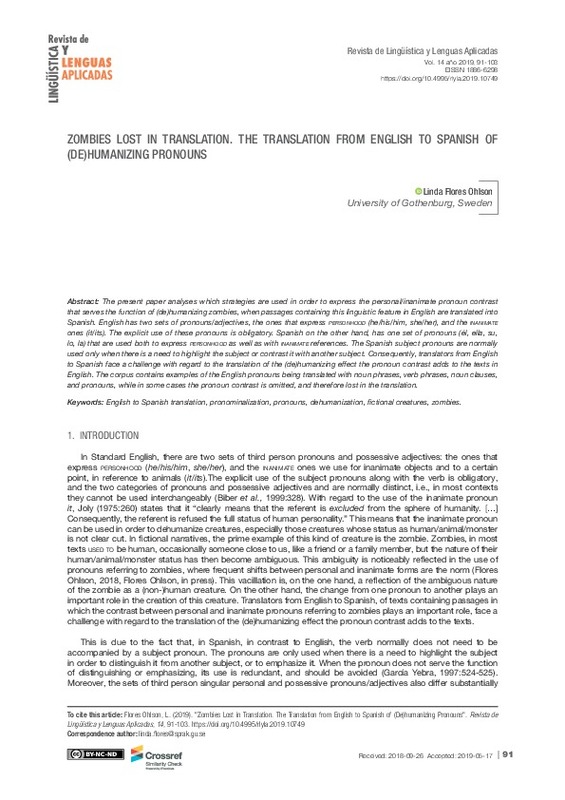JavaScript is disabled for your browser. Some features of this site may not work without it.
Buscar en RiuNet
Listar
Mi cuenta
Estadísticas
Ayuda RiuNet
Admin. UPV
Zombies lost in translation. The translation from English to Spanish of (de)humanizing pronouns
Mostrar el registro sencillo del ítem
Ficheros en el ítem
| dc.contributor.author | Flores Ohlson, Linda
|
es_ES |
| dc.date.accessioned | 2019-07-22T08:12:15Z | |
| dc.date.available | 2019-07-22T08:12:15Z | |
| dc.date.issued | 2019-07-19 | |
| dc.identifier.issn | 1886-2438 | |
| dc.identifier.uri | http://hdl.handle.net/10251/123889 | |
| dc.description.abstract | [EN] The present paper analyses which strategies are used in order to express the personal/inanimate pronoun contrast that serves the function of (de)humanizing zombies, when passages containing this linguistic feature in English are translated into Spanish. English has two sets of pronouns/adjectives, the ones that express personhood (he/his/him, she/her), and the inanimate ones (it/its). The explicit use of these pronouns is obligatory. Spanish on the other hand, has one set of pronouns (él, ella, su, lo, la) that are used both to express personhood as well as with inanimate references. The Spanish subject pronouns are normally used only when there is a need to highlight the subject or contrast it with another subject. Consequently, translators from English to Spanish face a challenge with regard to the translation of the (de)humanizing effect the pronoun contrast adds to the texts in English. The corpus contains examples of the English pronouns being translated with noun phrases, verb phrases, noun clauses, and pronouns, while in some cases the pronoun contrast is omitted, and therefore lost in the translation. | es_ES |
| dc.language | Inglés | es_ES |
| dc.publisher | Editorial Universitat Politècnica de València | |
| dc.relation.ispartof | Revista de Lingüística y Lenguas Aplicadas | |
| dc.rights | Reconocimiento - No comercial - Sin obra derivada (by-nc-nd) | es_ES |
| dc.subject | English to Spanish Translation | es_ES |
| dc.subject | Pronominalization | es_ES |
| dc.subject | Pronouns | es_ES |
| dc.subject | Dehumanization | es_ES |
| dc.subject | Fantastic creatures | es_ES |
| dc.subject | Zombies | es_ES |
| dc.title | Zombies lost in translation. The translation from English to Spanish of (de)humanizing pronouns | es_ES |
| dc.type | Artículo | es_ES |
| dc.date.updated | 2019-07-22T06:59:16Z | |
| dc.identifier.doi | 10.4995/rlyla.2019.10749 | |
| dc.rights.accessRights | Abierto | es_ES |
| dc.description.bibliographicCitation | Flores Ohlson, L. (2019). Zombies lost in translation. The translation from English to Spanish of (de)humanizing pronouns. Revista de Lingüística y Lenguas Aplicadas. 14:91-103. https://doi.org/10.4995/rlyla.2019.10749 | es_ES |
| dc.description.accrualMethod | SWORD | es_ES |
| dc.relation.publisherversion | https://doi.org/10.4995/rlyla.2019.10749 | es_ES |
| dc.description.upvformatpinicio | 91 | es_ES |
| dc.description.upvformatpfin | 103 | es_ES |
| dc.type.version | info:eu-repo/semantics/publishedVersion | es_ES |
| dc.description.volume | 14 | |
| dc.identifier.eissn | 1886-6298 |








